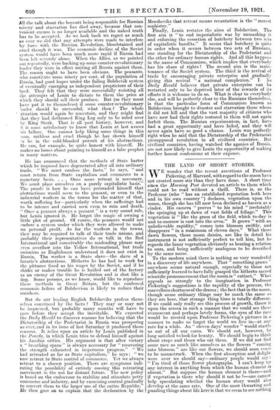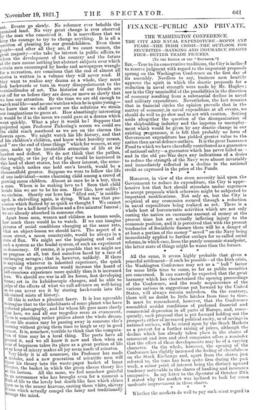THE LAND OF SHORT STORIES.
WE wonder that the recent assertions of Professor Pickering, of Harvard, with regard to the moon have not created more stir than they have done. A- short time since the Morning Post devoted an article to them which could not be read without a thrill. There is, so the Professor (who " has an established reputation both here and in his own country ") declares, vegetation upon the moon, though she has till now been declared as barren as a cinder. His camera " proves " to his mind " irrefutably the springing up at dawn of vast fields of foliage." This vegetation is " like the grass of the field, which to-day is and to-morrow is cast into the oven." It grows " with an unbelievable rapidity," comes into blossom swiftly, and disappears " in a maximum of eleven days." What these dawn flowers, these moon daisies, are like in detail his instrument is not sufficiently perfect to tell him, but ho regards the lunar vegetation obviously as bearing a relation to ours, and being sufficiently analogous to be described by the same name. To the modern mind there is nothing so very wonderful in a discovery of life anywhere. That " something grows " anywhere seems natural enough, especially to those not sufficiently learned to have fully grasped the hitherto sacred scientific pronouncement that the moon is " extinct." Wha t appeals so strongly to the imagination in Professor Pickering's suggestions is the rapidity of the process, the marvellous shortness of the drama ; the fact that in the moon, though some ordinary things may be much the same as they are here, that strange thing time is totally different. If we could only really see this process of growth, throw it upon the screen in such a manner that we could see these evanescent and perhaps lovely forms, the eyes of the race would be riveted upon Professor Pickering's pictures in a manner to make us forget the world we live in—at any rate for a while. An " eleven days' wonder " would startle us out of all our cares. We should not, however, bo long satisfied to look for beauty. We should begin to think about crops and those who eat them. If we did not find some race as much like ourselves as the flowers " coming into blossom " are like our flowers, we should soon cease to be moonstruck. When the first absorption and delight were over we should say—ordinary people would say : " I'm tired of those flower photographs. I can't keep up any interest in anything from which the human element is absent." But suppose the human element is there—and if vegetation is there why should it not be ?—one cannot help speculating whether the human story would also develop at the same rate. One of the most thwarting and puzzling things about life here is that we seem to see nothing out. Events go slowly. No reformer ever beholds the promised land. No very great change is ever observed by the man who conceived it. It is marvellous that we keep the courage to try to change anything. It is all a Question of planting for our grandchildren. Even those people—and after all they are, if we count women, the great majority—who take no interest in public affairs, to whom the development of the country and the future of the race means nothing but abstract subjects over which certain men encouraged by books and newspapers wrangle for a recreation, arc conscious that the end of almost all stories is written in a volume they will never read. If they want to realize any drama as a whole, they must look backwards or turn in weary disappointment to the verisimilitudes of art. The histories of our friends are cut off for us before they are done, or move so slowly that wo lose our attention. By the time we are old enough to watch real life—and no one watches when he is quite young- wo know that we shall never see the solutions we strain our imaginations to guess at. How absorbingly interesting it would be if in the moon we could gaze at a drama which went quickly. What a play it would be I Suppose that projected upon Professor Pickering's screen we could see the child reach manhood as we see on the cinema the flowers open. We might watch his life history, and that of his children's children, and know what heredity means, and " sec the end of those things " which for women, at any rate, make up the irresistible attraction of life at its hardest and dullest. We do not think that the pathos, the tragedy, or the joy of the play would be increased in this land of short stories, but the sheer interest, the some- thing which makes one hold one's breath, would be a thousandfold greater. Suppose we were to follow the life of one individual—some charming child among a crowd of growing moon children. Almost at once he is a boy, then a man. Whom is he making love to ? Soon that child beside him we see to be his son. How like, how unlike 1 we exclaim. Shortly our hero has " filled out," is middle- aged, is shrivelling again, is dying. What was that pro- cession which flashed by as quick as thought I We cannot be sorry for a half-hour's illness and a five minutes' funeral ; we are already absorbed in someone else. Apart from men, women and children as human souls, how much there would be to watch. If we can imagine pictures of social conditions changing at the same rate, what an object-lesson we should have. The aspect of a moon street, a moon countryside, would bo always in a state of flux. We might see the beginning and end of such a system as the feudal system, of such an experiment as democracy. Of course, it is possible that we might see no progress at all, but find ourselves faced by a race of unchanaing savages ; that is, however, unlikely. If there is anything whatever in inherited experience, the quick passage of the generations would increase the hoard of half-conscious experience more quickly than it is increased here. We should see war in all its forms, fast developing forms; art in its kaleidoscopic changes, and bo able to judge of the effects of what we call advance on well-being as we can never see it by staring backwards into the ink-stained mists of history. All this is rather a pleasant fancy. It is less agreeable to imagine that to the inhabitants of some planet who have Perfected photography, and for whom life goes more slowly than here, we and all our tragedies seem as evanescent. There is something rather pitiless about the whole dream. All our life stories may bo passing away in someone else's morning without giving them time to laugh or cry in good earnest. It is, somehow, terrible to think that the computa- tion of time may be a local thing. The poets have all guessed it, and we all know it now and then when an Wit of happiness takes its place as a great portion of life or an hour of misery makes all joy seem made of minutes. Very likely it is all nonsense, the Professor has made .11, mistake, and a new generation of scientific men will throw his theory into the waste-paper basket of lunar tcories, the basket in which the green cheese theory lies t the bottom. All the same, we feel somehow grateful ° an astronomer who has brought even for a moment a ash of life to the lovely but death-like face which shines Nil Ira in the nearer heavens, casting those white, shivery 4112S which actually compel the fancy and traditionally range the mind.







































 Previous page
Previous page